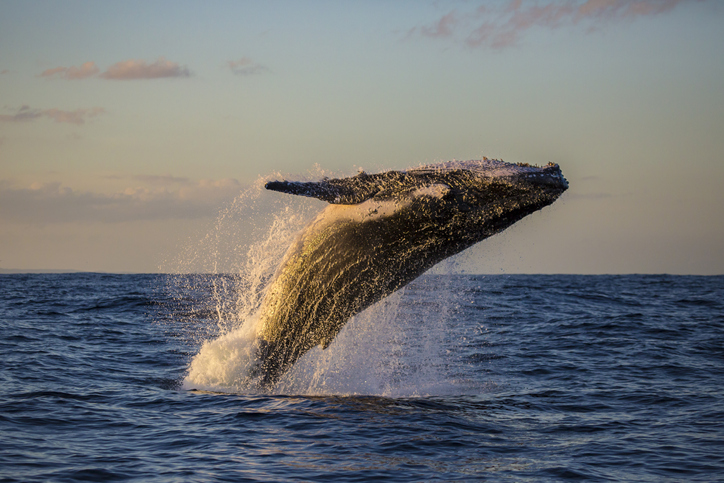All decent people agree: hunting whales should be illegal. And while many countries ended commercial whaling some 40 years ago, Iceland, Japan, and Norway still allow the trade to continue, killing more than a thousand of these magnificent animals every year.
It’s an appallingly cruel, pointless, and disgusting practice that has to stop. But the suffering of these intelligent, complex animals goes far beyond the whaling industry. Every one of us can help save whales every single day – simply by not eating fish and other aquatic animals.
The cruelty of the commercial whaling industry has drawn the ire of people around the world, and rightly so. When whales come to the surface for air, they are hit by grenade-tipped harpoons fired from cannons, which slam half a metre deep into their bodies. Each whale may be stabbed by multiple harpoons. Moments after the first waves of pain hit, the grenades explode, blasting shrapnel through their flesh. Their fear and agony can last for an hour or more as they slowly bleed to death. They are then tied up, dead or dying, and towed to the nearest “butcher station” to be carved up, sometimes while still conscious.
All this horror is inflicted on animals who feel pain just as much as humans do, live in complex social groups, communicate in different dialects, and grieve for their loved ones. They deserve better.


Commercial whaling was banned in 1986 by the International Whaling Commission (IWC) over concerns that hunting threatened many species with extinction – but this hasn’t stopped the slaughter, as 40,000 large whales and millions of smaller whales and dolphins have been killed since then.
Why?
Because Iceland refused to recognise the ban, Norway decided to ignore it and resumed whaling in 1993, and Japan withdrew from the IWC in 2018 after its proposal to reintroduce commercial whaling was rejected.
Other communities, such as those in the Faroe Islands and Inuit populations in Greenland, are permitted to hunt whales by the IWC under claims it is part of their heritage. But times and sensibilities change, and traditions based on cruelty must change, too. Last year, graphic, bloody footage of the annual “grind” or slaughter of whales in the Faroe Islands led to worldwide outrage. In the grind, hunters force metal hooks into whales’ blow-holes and use ropes to drag them to shore, where they are stabbed to death with knives and spears.
Yet research shows that the younger generations on the islands reject the grind, while half of all adults there rarely or never eat whale – in fact, the Faroes’ own medical officers warn against it, due to the high levels of toxins that can cause permanent health issues and may harm children’s development.
So why are whales still hunted? As ever, the driving force is money. Their blubber and body parts are sold for food, pharmaceuticals, and supplements. Some countries, including Iceland, offer whale meat to tourists as a local “delicacy”, although very few of their own residents actually eat it. There is evidence that declining demand for whale meat has led to carcasses being dumped in landfills.
It’s long past time for communities to stop propping up this dying industry. Ending whale hunts could even be a financial boon, as many tourists currently shun destinations linked to the whaling industry.
While countries that engage in commercial whaling must read the writing on the wall and ban these cruel hunts – and sanctions must be brought to bear if they do not – we don’t have to wait for governments to act. We can all help whales and other aquatic animals right now. It’s as simple as banishing sea animals from our plates.
It may not grab headlines as whaling does, but the biggest threat to cetaceans today is the commercial fishing industry. In addition to killing billions of fish – smart animals who form emotional attachments, are savvy social learners, develop cultural traditions, and use tools – every year, fishing nets trap hundreds of thousands of whales, dolphins, and porpoises, who are then tossed away, either dead or dying, as “bycatch”.
Like humans, whales and dolphins breathe air and suffocate if they can’t return to the surface. Whales who become entangled in nets and other heavy fishing gear can drown, die of exhaustion after weeks of struggling to free themselves, or slowly starve to death if the gear is lodged in their mouths and prevents them from eating. The situation is urgent: six out of the 13 great whale species are now classified as endangered or vulnerable, even after decades of protection, and there are just 336 North Atlantic right whales left in the world.
Less demand for fish means less deadly fishing gear, plain and simple. That is why anyone who wants to help whales – and other aquatic animals – should go vegan and leave all fish off their plates.

